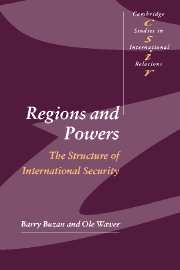Book contents
- Frontmatter
- Contents
- List of illustrations
- Preface
- List of abbreviations
- 1 Patterns of regional security during the Cold War
- 2 Patterns of regional security post-Cold War
- Part I Introduction: developing a regional approach to global security
- Part II Asia
- Part III The Middle East and Africa
- Part IV The Americas
- Introduction
- 9 North America: the sole superpower and its surroundings
- 10 South America: an under-conflictual anomaly?
- Conclusions: scenario for the RSCs of the Americas
- Part V The Europes
- Part VI Conclusions
- Glossary
- References
- News media
- Index of names
- General Index
- CAMBRIDGE STUDIES IN INTERNATIONAL RELATIONS
10 - South America: an under-conflictual anomaly?
Published online by Cambridge University Press: 05 December 2009
- Frontmatter
- Contents
- List of illustrations
- Preface
- List of abbreviations
- 1 Patterns of regional security during the Cold War
- 2 Patterns of regional security post-Cold War
- Part I Introduction: developing a regional approach to global security
- Part II Asia
- Part III The Middle East and Africa
- Part IV The Americas
- Introduction
- 9 North America: the sole superpower and its surroundings
- 10 South America: an under-conflictual anomaly?
- Conclusions: scenario for the RSCs of the Americas
- Part V The Europes
- Part VI Conclusions
- Glossary
- References
- News media
- Index of names
- General Index
- CAMBRIDGE STUDIES IN INTERNATIONAL RELATIONS
Summary
Why are there relatively few interstate wars in South America? Interstate security dynamics have mostly been secondary to domestic issues, and the ‘unstructured’ explanation that works for such a situation in Africa does not hold for the much more developed South America. The possibility of war certainly has not been absent from the continent: military force has been threatened or used more than two hundred times in the twentieth century (Mares 1997: 195; 2001: 38). South America has not been a security community or anything close to it. Still there have been relatively few wars, and those that have occurred in the twentieth century have been markedly more limited and less destructive than those of the nineteenth century. In the nineteenth century, wars ‘were long, spread beyond two parties, and entailed great loss of life and exchange of territory. Twentieth century wars have been more limited affairs’ (Mares 1997: 196). Yet political violence is not low, quite the contrary. In one sense, the wars of independence continued into wars of state formation that then became civil wars. The civil wars of the Americas are among the bloodiest conflicts: the American Civil War, the Mexican revolution, the violencia in Colombia, the Central American wars of the 1980s.
Other issues to be given special attention (partly because of their particular interest for RSCT) are: (1) the relationship to a dominant great power neighbour; and (2) the process of a possible division of an RSC as the northern and southern parts of South America seemingly part ways – and the factors that restrain such a process.
- Type
- Chapter
- Information
- Regions and PowersThe Structure of International Security, pp. 304 - 339Publisher: Cambridge University PressPrint publication year: 2003

